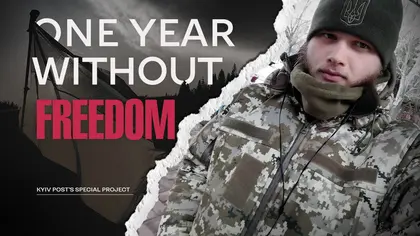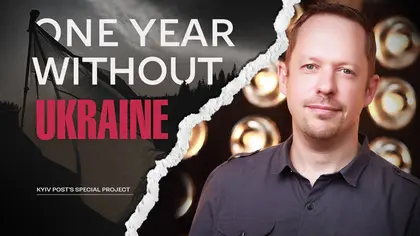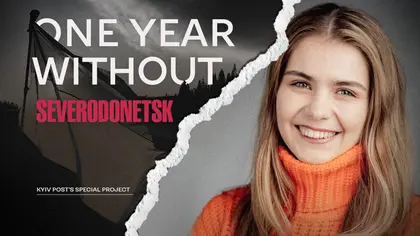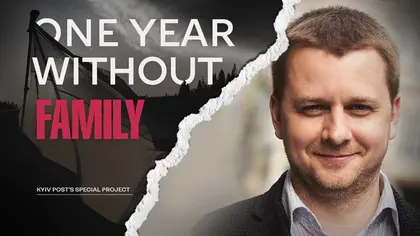Today is the one-year anniversary of Russia’s brutal, unprovoked, full-scale invasion of Ukraine. To mark the occasion, Kyiv Post has collected 17 stories to try and convey the breadth and scale of the loss caused to Ukrainians caused by the Kremlin’s aggression.
JOIN US ON TELEGRAM
Follow our coverage of the war on the @Kyivpost_official.
Andriy Kotsar joined the Armed Forces of Ukraine (AFU) almost a year ago. During this time, he took part in the battles for Izyum. He was taken prisoner and tortured by the Russians. He even considered suicide.
However, after his liberation from captivity, Andriy did not immediately receive the medical assistance he needed. Not only, but the authorities also wanted to collect Hr. 37,000 from him for the weapon he’d lost during the occupation. We caught up with Andriy to find out what happened.
At the beginning of the war
War came to the town of Borova, in the Kharkiv Region, on the morning of Feb. 24. Andriy woke up at 5 am to Russian shelling.
“I was ready for the war to start. It was openly written about in the newspapers, and we also discussed a possible war with friends. I decided for myself that I would join the Armed Forces,” Andriy recalls.
The next day, Febr. 25, Andriy went to the nearby city of Izyum to join the AFU.
“Together with my compatriots, we went to Izyum. We got to the Military Commissariat, but it was a mess. Everyone ran somewhere and talked about possible shelling. They refused to take documents from us. So some of the boys went home. The rest of us decided to join the territorial defense (TRO). They immediately accepted us, gave us weapons, and we began to perform military tasks.”
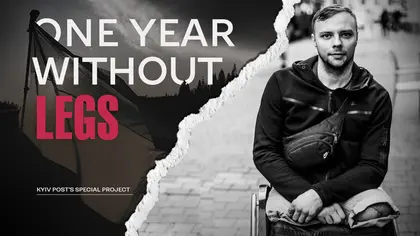
One Year Without Legs
Almost immediately, Izyum found itself at the epicenter of hostilities. There was active shelling in the city, which intensified at the end of February and beginning of March.
“In mid-March, our command evacuated the population and left together with civilians. Our unit was left in the city, and they promised to pick us up in four days. But due to constant shelling, we lost contact, and no one gave us assembly points. We were left behind, and the enemy surrounded the city. Time passed, but there was no information about evacuation, so my friends and I decided to act independently. We decided to hide our weapons and lie in wait for the arrival of the AFU or subversive groups,” Andriy recalls.
Russian occupation and captivity
By mid-March 2022, the city was already occupied by the Russians. Izyum was under occupation until September 2022. During this time, Andriy was in Russian captivity three times. The fighter was tortured and threatened with murder. However, Andriy never gave the Russians any information about weapons or other fighters.
Andriy managed to hide from the Russians. He found temporary shelter in his colleague’s house. Then one day, a neighbor came and informed them that the Russians were looking for Andriy.
“I had to leave my colleague's house in order not to put him in danger. The next day, March 31, I went to Borova. On the way, I managed to bypass four roadblocks without much trouble, but at the fifth roadblock, while checking my smartphone, the Russians found information that I was passing on to Ukrainian intelligence. I was sure I had deleted all accounts and information. Still, they found residual files and screenshots with the geolocations of their units.”
Andriy was captured for the first time and held captive by military personnel from the Luhansk People’s Republic (an illegal quasi-state created by the Russian occupation authorities in the occupied territory of the Luhansk region of Ukraine). They beat him and tried to find out information about his weapons. They put a lot of pressure on me psychologically – they shot into the air above my head, threw dummy grenades at my feet, took me to minefields and shot behind my back to scare me. These tortures lasted for five days.
Later, one of their leaders came to them and they handed the prisoner over to him.
“This boss of theirs was very polite. He told me that I am cannon fodder, and we are ‘one piece of shit.’ I was also told that if I surrendered my weapon, I would remain alive. Then they took all my documents and let me go. I was badly beaten, so I decided to spend the night in the church because there was nowhere to go. I decided not to go home so as not to endanger my relatives.”
The night was very difficult for the Andriy, he was haunted by thoughts of suicide. The next day, on his way to the place where his weapon was supposed to be he was detained again.
“I was transported to a place unknown to me and after being beaten I was locked in a small room. There was not much space, movements were severely restricted, and no food was given, only a small bottle of water. I spent two days there. They periodically took me out of the cell to beat me, then locked me up again.”
Two days later, the Andriy was handed over to Russian intelligence. They began to ask about weapons and comrades again. Andriy was threatened with death and dismemberment.
"I came up with one story and stuck to it. They decided that I didn't know anything, lost interest in me, and let me go after a few days. But before that, they forced me to record a video in which I had to say that I work for the Russians.”
After the second time he was captured, the soldier went to a local monastery, where he helped refugees from Izyum and nearby villages who had lost their homes.
The fighter lived at the monastery for several months. However, in July, while at the monastery, Russian special services came to him.
“We talked, then they went away, but promised to return. Two days later they came again. I was required to show the places where we were with the unit. Then they took me in an unknown direction. They brought me to a garage where there was a torture chamber. I stayed there for sixteen days. They beat me almost every day, tortured me with electric shocks, and psychologically pressured me all the time. I thought several times that I was going to die. Eventually they took me to the city and threw me out of the car. I went to church, lived with the monks, and tried to help people.”
After the liberation
After the liberation of Izyum, Andriy was found by his colleagues and journalists of the Associated Press. He told the journalists Vasylisa Stepanenko and Yevhen Maloletka his story, and they tried to help the fighter renew his documents so he could go to rehabilitation. At that time, Andriy was constantly tormented by nightmares and thoughts of suicide.
A week after Izyum’s liberation, Andriy was taken to the city to testify.
“I told them everything that happened to me and passed the polygraph. Even then, I started having psychological problems. I asked for medical help. However, it was never given to me. Me and several other missing soldiers were gathered in one place in Izyum, and we waited for three months to see what would happen next.”
The soldiers were promised help with rehabilitation, with monetary payments, but it turned out that they were redistributed to different military units. Andriy was sent to Dnipro, and then to the front line in Lyman as a fighter. Only here did the major take care of him.
“He sent me to Dnipro again, but they didn’t want to put me in treatment there. Only after applying to the unit was I sent to Poltava for treatment.”
A fine for his troubles
After almost a year in the AFU and six months of captivity and occupation, Andriy received his first payments in January.
“When I was still in Izyum, an official investigation was conducted. I got the results only in January when I called our unit’s accountant. I wanted to know if there were any payments planned for me. He told me that there were no payments yet, but I already had a debt of Hr. 37,000 for the lost weapon. I knew that an investigation was being conducted in Izyum, but I didn’t think that I would be informed about it like this,” the soldier says.
Friends helped Andriy find a lawyer who would agree to take on his case.
“I spoke with a lawyer. He says that, unfortunately, such cases are not unique. In his practice, there have already been similar cases with the military in the Kherson region,” Andriy explains. He hopes that the debt will be written off in court.
Andriy is now undergoing treatment in Poltava, and for the first time in many months he was able to sleep without nightmares.
“This horror is forever with me now, but I’m very happy that I was able to finally fall asleep without nightmares,” he says.
You can also highlight the text and press Ctrl + Enter


